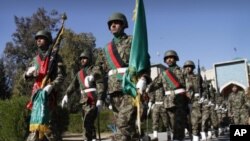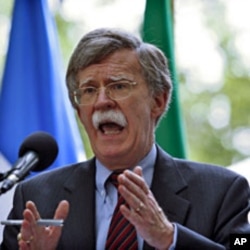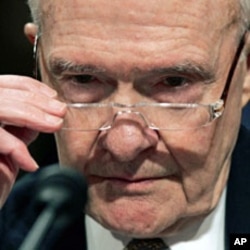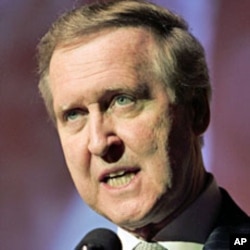In Afghanistan, the goal of the United States and the North Atlantic Treaty Organization - or NATO, is to hand over combat operations to the Afghan forces by the end of 2014.
NATO has been operating in Afghanistan since 2003, leading a 130,000-strong United Nations-mandated contingent known as the “International Security Assistance Force” - or ISAF.
NATO missions
NATO has three missions in Afghanistan. The first is to assist the government of President Hamid Karzai in its efforts to rebuild and stabilize the country. The second is to train the Afghan army and police. And the third mission is to hunt down and eliminate insurgents, especially in southern Afghanistan - home of the Taliban, ousted from power by a U.S.-led coalition in 2001.
The U.S. and NATO goal is to hand over combat operations to the Afghan forces by the end of 2014.
But John Bolton, former U.S. Ambassador to the United Nations, is skeptical that the Afghan security and armed forces will be up to the task.
“I don’t think they will be, but it’s in part not because of a lack of training or a lack of equipment," said Bolton. "I think there is a fundamental disjunction in the policy here: we’re looking at Afghanistan as a state, as if it were somewhere in Western Europe - and it’s not. The issue therefore is not really the capability of the Afghan government - it should be the continuing extent of the Taliban/al-Qaida threat. And I think that is something that every indication we have is that that threat will continue, no matter what the paper qualifications of an Afghan government might look like in 2014 or 2015 or whenever.”
Taliban
The Taliban recently announced it will open a political office in Qatar. Some experts say this could lead, eventually, to preliminary talks leading to peace negotiations.
But former National Security Adviser General Brent Scowcroft urges caution.
“It’s very hard for us to negotiate with the Taliban," he said. "They want us out. So almost anything we negotiate, they will be successful. We want them to agree not to turn to terrorism and not to be a haven for al-Qaida. But once we’re gone, we have absolutely no control over them - so it’s kind of a one-sided negotiation.”
Former Defense Secretary William Cohen says discussing peace with the insurgents will depend on what Taliban faction you are talking about.
“If it’s the Taliban that has decided that it is going to lay down its arms and work towards a peaceful solution for the country - that might be something at least worth discussing," said Cohen. "I think it’s going to have quite a difficult hill to climb, however, since many of the Afghan people have been the victims of Taliban rule in the past and don’t want to return to that. So how the Taliban are seen and how they conduct themselves in the future, I think will be important in determining whether or not there is any role for them to play.”
Cohen, Bolton and Scowcroft
Cohen, Bolton and Scowcroft believe any long-lasting solution to the Afghan conflict must include neighboring Pakistan.
General Scowcroft says Washington must work hard to stabilize relations with Islamabad.
“We have had difficult relations with Pakistan off and on from the time of its creation, when we were their principal security blanket," he said. "From the Pakistani point of view, we have abandoned them several times. And so they are very ambivalent about trusting the United States. But we need to have a relatively stable, prosperous Pakistan to have a region there which suits our minimum needs.”
Relations between the United States and Pakistan plunged last November when a NATO attack killed some two dozen Pakistani soldiers. Islamabad reacted by shutting down all NATO supply routes transiting from Pakistan into Afghanistan. Those routes remain closed.







